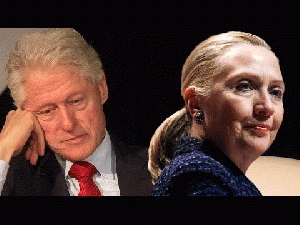Reprinted from Reader Supported News
Many Americans see the North Atlantic Treaty Organization as our ultimate line of defense. Some view it as an American puppet. Both takes need serious rethinking. NATO and its implicit ties to the European Union (EU) have come to pose an unexpected threat to the United States, and nowhere more dramatically than in Bill and Hillary Clinton's interventions in the Balkans and Ukraine and her unending push for military action, especially in Libya.
"I know the United States has taken some actions against terrorists inside Libya, particularly ISIS training camps," Hillary told CNN on February 23, "and I support that."
These actions are open and covert preparations for an allied war in Libya, as I reported last week, drawing on French media. Hillary may not have known the full story when she talked to CNN. But given her experience, contacts, and leading role in promoting the first Libyan war, she certainly knows what's coming.
NATO's place in all this has been less clear, reflecting how far the alliance has evolved. At the start in 1949, its first secretary general, Lord Ismay, famously quipped that its purpose was to "keep the Germans down, the Russians out, and the Americans in." The fall of the Berlin Wall four decades later, the collapse of the Soviet Union, and the epic transition from the Common Market to the European Union have made the uses of NATO more complex, less predictable, and potentially more dangerous. The resulting rat's nest will cause grief no matter who becomes the next US president.
German chancellor Helmut Kohl and President George H.W. Bush opened the door to danger when they hoodwinked Mikhail Gorbachev, the last leader of the Soviet Union, into believing that they would not expand NATO to the east. Bill Clinton then led NATO to bring in Poland, the Czech Republic, Hungary, Estonia, Latvia, Lithuania, Slovenia, Slovakia, Bulgaria, and Romania. This put the world's most powerful military alliance right on Russia's doorstep, feeding a real, if historically overblown, sense of victimhood that Vladimir Putin puts at the heart of his national narrative.
"The policy of containment was not invented yesterday," he declared in his State of the Nation speech at the end of 2014. "It has been carried out against our country for many years, always, for decades, if not centuries. In short, whenever someone thinks that Russia has become too strong or independent, these tools are quickly put to use."
Without question, the proximity of a nuclear-armed NATO has provoked Russia to respond. But Putin has chosen the responses to make, whether preaching an increasingly right-wing Christian nationalism, "the historical reunification of Crimea and Sevastopol with Russia," massing his troops and little green men to back armed conflict in Ukraine, making nuclear threats, or funding Marine Le Pen and her father Jean-Marie here in France and reportedly the right-wing, anti-immigrant AfD in Germany.
NATO's expansion has also encouraged Eastern European nations -- even those not formally members of the alliance, such as Georgia -- to bait the Russian bear, foolishly expecting the United States and its allies will come to their aid.
The Balkan Express
Besides pushing NATO beyond its original theater of operations, presidents George H.W. Bush and Bill Clinton joined with Germany to redefine NATO's mission, most dramatically in the former Yugoslavia. As early as 1992, NATO began playing a small role in conjunction with United Nations peacekeepers in Bosnia and Herzegovina. Clinton then pushed for a massive intervention after the July 1995 massacre in the village of Srebrenica, in which Bosnian Serbs rounded up and killed some 8,000 Muslims.
If ever a massive bloodletting cried out for international intervention, Srebrenica seemed the perfect case. But, as so often happens in supposedly humanitarian acts of war, Bill Clinton and his top foreign policy advisers had a much larger agenda and a truly imperial vision.
Richard Holbrooke, a one-time managing director of Lehman Brothers who became ambassador to Germany and assistant secretary of state, saw an expanded NATO as central to preserving American leadership throughout a stable, unified Europe, which would embrace democracy, Western values, and "free-market economies." Chancellor Kohl, French president Mitterrand, and their allies were just creating a newly strengthened European Union, and would -- with the Clinton administration's encouragement -- turn it into a bastion of neo-liberal economics.
Strobe Talbott, Clinton's deputy secretary of state, saw an expanded NATO primarily in terms of exercising hegemony over a weakened and pliable Russia. Now president of the Brookings Institution, he remains a friend and advisor to the Clintons.
Zbigniew Brzezinski, the grand old man of the Democratic foreign policy establishment, saw a much bigger goal in the control of Eurasia and its vast oil and gas reserves. "NATO entrenches American political influence and military power on the Eurasian mainland," he wrote in The Grand Chessboard. "A wider Europe and an enlarged NATO will serve the short-term and longer-term interests of U.S. policy."
Only a few savvy outsiders saw at the time the vast scope of these ambitions, which extended beyond Western Europe, beyond the EU, beyond Russia, and into the regions once controlled by the Ottoman Turks. In pushing NATO into Bosnia, the Clinton administration was looking to make the United States "the leader of an informal collection of Muslim nations from the Persian Gulf to the Balkans," wrote Jacob Heilbrun and Michael Lind in The New York Times in January 1996. "The disintegration of the Soviet Union has prompted the United States to expand its zone of military hegemony into Eastern Europe (through NATO) and into formerly neutral Yugoslavia. And -- most important of all -- the end of the Cold war has permitted America to deepen its involvement in the Middle East."
(Note: You can view every article as one long page if you sign up as an Advocate Member, or higher).





